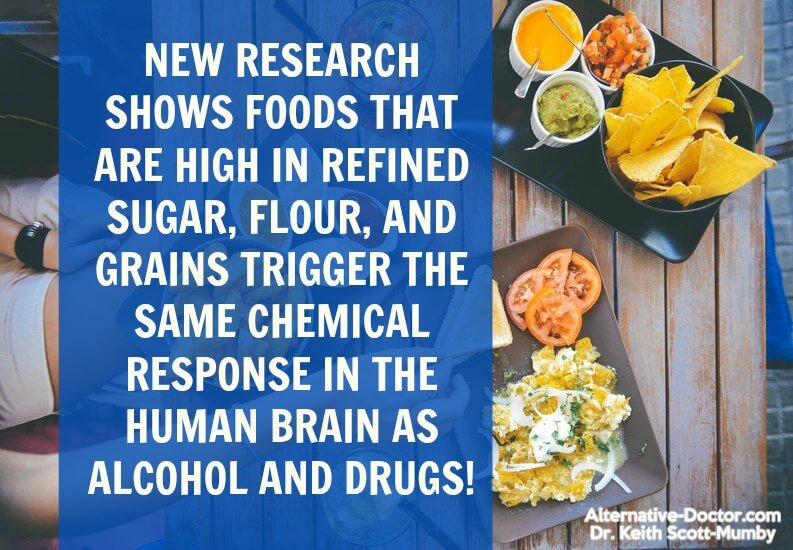If you think the obesity epidemic isn’t a real concern, I’d like to take this opportunity to convince you otherwise. Between 1980 and 2014, the rate of obesity worldwide has more than doubled according to the World Health Organization.
In less than four decades, the world has grown fatter, unhealthier, and (though we’re living longer) seemingly unconcerned with the quality of their additional years.
1.9 billion adults and more than 40 million children under the age of five are overweight or obese on this planet!
The poor quality of our diet, lack of exercise, and bad habits have led us to this. A growing trend in these statistics are those who claim to be “addicted to food.”
Could this be possible? Could food addiction explain our expanding waistlines and the decline of mankind’s health?
Until recently, such claims were mocked as the excuse of those who were lazy or uncaring of their “outer appearance” rather than addressed as a possible explanation for a global problem.
Before I address the science that backs such claims, I want to be absolutely clear.
I’ve said for years that the refined sugars, GMO soy, and chemical toxins being added to our food supply would cause a chain reaction (chemically and physically) within the human body that would alter how we process our food fuel.
For you see, the research on food addiction isn’t focused on lean proteins, healthy fats, true grains, or fruits and vegetables. No one seems to be addicted to a lovely roasted chicken breast, sautéed vegetables, or a salad. Folks aren’t overeating soups or eggs or even steak. I imagine there are few reports of consumers “bingeing” on Greek yogurt or baby carrots.
A great number of those who are overweight or obese are addicted to garbage that masquerades as “real” food. Some items consumers were told to eat by “those in authority” – such as margarine, hydrogenated oils, soy products, and grains, grains, grains – coincide with the push by doctors, scientists, and governments worldwide to choose chemically altered “low fat” and “sugar free” products.
The additives, preservatives, and other junk in the most commonly consumed foods are killing us…not so slowly anymore.
Obesity has been named as a major risk for…
- Cardiovascular disease
- Diabetes
- Autoimmune disease
- Respiratory dysfunction
- Gastrointestinal disease
- Metabolic syndromes
- Infertility
- Neurodegenerative disease
- Disability
- Inflammatory conditions
- Chronic pain
- Chronic fatigue
- Cancer
- Non-alcoholic fatty liver
- Emotional problems
- Premature death
Your Brain and Addiction to Food
Foods that are high in refined sugar, flour, and grains trigger the same chemical response in the human brain as alcohol and drugs according to new research from Boston’s Children’s Hospital. The area of your brain that handles rewards and desire for something specific (known as the nucleus accumbens) is affected by over-processed carbs.
“Beyond reward and craving, this part of the brain is also linked to substance abuse and dependence, which raises the question as to whether certain foods might be addictive,” explained team lead, David Ludwig, MD, PhD and director of the New Balance Foundation Obesity Prevention Center.
They used MRI technology to map the brain of participants for four hours after consuming a meal to determine the link to eating behavior. The 12 men in the study were overweight or obese. Some were given shakes with a high glycemic index and others a shake that tasted the same but had a much lower glycemic index ingredients. Their blood sugar and hunger patterns were also measured.
The American Journal of Clinical Nutrition published the study and it is unique in the way the team evaluated participant brain activity for several hours following a meal to map how the brain responded over time rather than immediately following consumption. They also used the same foods with the same caloric content but slightly different ingredients, which provided a more stable way to determine results.
As suspected, those given the high glycemic index shakes crashed more quickly, were hungry again faster, and the addiction center of the brain was triggered which stimulated a “need” for more food.
Junk food. So much worse than you ever imagined.
Now, more than ever, you must know the glycemic index of the foods you’re eating. To combat food addiction, you must follow the same path as those addicted to drugs or alcohol. You have to remove the foods that make you feel out of control of your eating.
Urged Ludwig, “These findings suggest that limiting high-glycemic index carbohydrates like white bread and potatoes could help obese individuals reduce cravings and control the urge to overeat.”
Naturally, I want you to live a long life. However, if you don’t take steps right now to guard the most important “home” you’ll ever live in, those years could be filled with more doctor visits, procedures, and prescriptions than you think.
It’s time to act. Determine what foods affect your body by the process of elimination. I give you many ideas in my book, “Diet Wise” and you’re going to love the way it makes you feel.
Cutting back highly refined carbs isn’t the only answer to the obesity epidemic but it may help those who struggle with weight and poor health.
Food addiction is one of many reasons our health (and our weight) are out of control. Let’s take some of that control back. Right now. Together.
